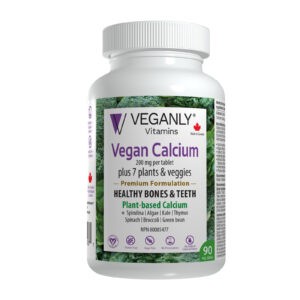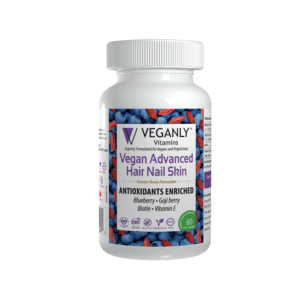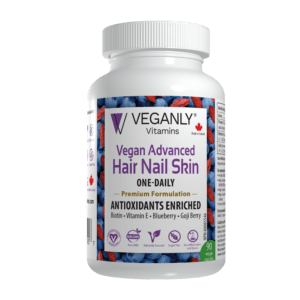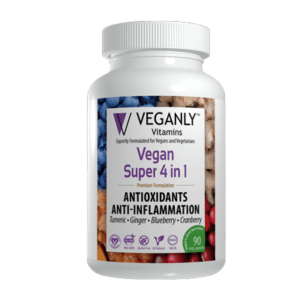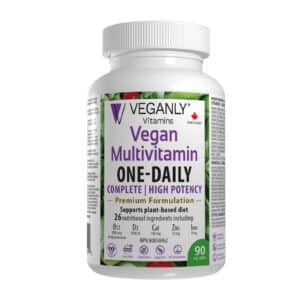Veganism is growing in popularity around the world as more and more people are realizing the advantages of an ethically-conscious, plant-based lifestyle. While more and more vitamin fortified nut-based milks, meat-replacements and other vegan products are becoming available at your local grocery store, many vegans still struggle with getting all the essential vitamins and nutrients that they need. This can be caused by not eating enough of a variety of plant-based whole-foods like whole grains, nuts, legumes, vegetables and fruit. With our increasingly busy lifestyles, it can be difficult to eat a balanced meal, especially on the go. It can also be difficult to find healthy food choices when traveling or when eating out at fast food and fast casual restaurants. What can you do to ensure that you get all the daily nutrients needed for maintaining a healthy vegan lifestyle?
Filling in the Gaps
Scientifically, some nutrients cannot be obtained through a completely plant-based diet so it’s important to find out what’s in your food and what you’re missing. Moving past the myths and getting to the specifics of nutritional requirements is crucial for a healthy body and mind.
Here are 3 of the most common vitamin supplements for vegans:
- Vitamin B12 – Vitamin B12 is mainly obtained through a variety of meat, fish, eggs, and dairy products along with fortified products. Since vegans do not consume meat, dairy or eggs, it can be very difficult to meet the daily B12 requirement, therefore taking a B12 supplement or multivitamin containing B12 is often recommended.
- Iodine – Dairy products are a common source of iodine for non-vegans. Vegans however can look to consuming a variety of sea vegetables like seaweed, kelp, hiziki and arame to keep up with their iodine requirements. Depending on where you live, it can be difficult to find these products and they can also get quite expensive. Again, a simple multivitamin or supplement can help prevent an iodine deficiency.
- Vitamin D – Commonly known as the sunshine vitamin, it is produced naturally by our bodies when the skin, liver, and kidneys work together to convert the sun’s energy into useful vitamin D. Those concerned with UV exposure or spend the majority of their time indoors, may want to gain sufficient vitamin D through foods. However, since vitamin D is most commonly found in fish, shellfish, and egg yolks, vegans don’t have many options. In this case, supplements are recommended to help meet daily requirements.
Supplementing Smartly
Supplements are often looked down upon by some members of the vegan community because they see them as an unnatural source. There are a number of choices out there for vitamins and supplements, many are produced with all-natural ingredients to the highest quality industry standards. However, before following any advice, it is recommended that you do your research and speak with a certified nutritionist or health professional to get more information. The key is to know what key nutrients you’re missing from your vegan diet and finding the right foods or supplements to fill in those gaps. By doing so, you’ll be well on your way to fueling a healthy and active vegan way of life.
THE CONTENT AVAILABLE VIA THE WEB SITE IS PROVIDED WITH THE UNDERSTANDING THAT NEITHER VEGANLY NOR ITS SUPPLIERS OR USERS ARE ENGAGED IN RENDERING MEDICAL, COUNSELING, LEGAL, OR OTHER PROFESSIONAL SERVICES OR ADVICE.
SUCH CONTENT IS INTENDED SOLELY AS A GENERAL EDUCATIONAL AID. IT IS NOT INTENDED AS MEDICAL OR HEALTHCARE ADVICE, OR TO BE USED FOR MEDICAL DIAGNOSIS OR TREATMENT, FOR ANY INDIVIDUAL PROBLEM. IT IS ALSO NOT INTENDED AS A SUBSTITUTE FOR PROFESSIONAL ADVICE AND SERVICES FROM A QUALIFIED HEALTHCARE PROVIDER FAMILIAR WITH YOUR UNIQUE FACTS. ALWAYS SEEK THE ADVICE OF YOUR PHYSICIAN OR OTHER QUALIFIED HEALTHCARE PROVIDER REGARDING ANY MEDICAL CONDITION AND BEFORE STARTING ANY NEW TREATMENT.

